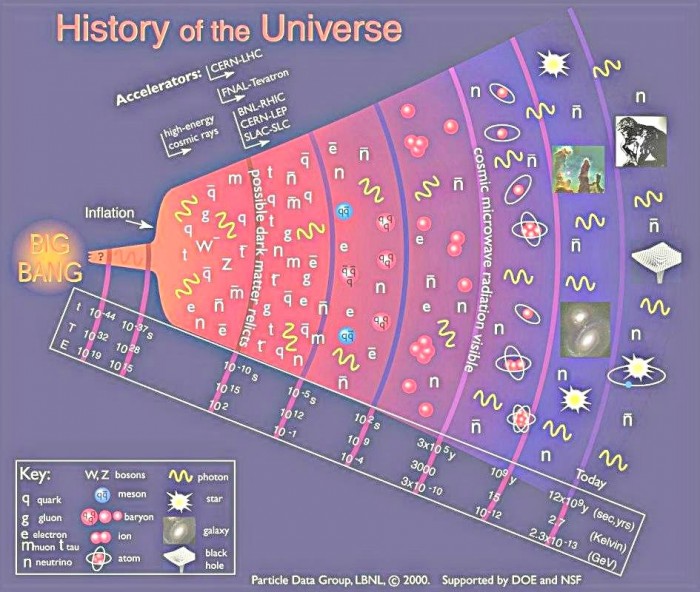The Big Bang Was an Explosion OF Space, Not IN Space
5 Μαΐου 2010
In the beginning God created the heavens and the earth.
(Genesis 1:1)
In the beginning was the Word, and the Word was with God, and the Word
was God.
(John 1:1)
“I have made the earth, and created man upon it: I, even my hands, have
STRETCHED OUT THE HEAVENS, and all their host have I commanded.”
(Isaiah 45:12)
This is my fourth post for Just Science Week.
I think the thing that trips up most people when they think about the Big Bang, is thinking about it in terms of an explosion, like a supernova or a nuclear bomb. This leads to some typical inaccurate assumptions.
Since the Big Bang, the universe has expanded from a central point.
The universe must be expanding into something, what?
There was a time BEFORE the Big Bang.
These assumptions come from thinking about the Big Bang as a typical explosion, one originating from a single point and spewing matter out concentrically from there.
That’s not what the Big Bang was.
The Big Bang was not an explosion of matter into space, rather it was an explosion of space ITSELF, and since space and time are interconnected, we really have to say it was an explosion of space AND time, or space-time.
So, the Big Bang wasn’t an explosion of stuff like atoms or molecules, it was an explosion of a place and instance, it was the creation of when and where.
Before the Big Bang there was simply nothing, there was no ‘where’ nor was there a ‘when’. It doesn’t even make sense to say ‘before the Big Bang’.
I know, that’s pretty trippy, so let me try stretch my writing skills to the absolute max and see if I can make this sound reasonably coherent.
To begin, clear your mind of any notion of an explosion. The Big Bang was not an explosion, not of matter anyway.
- The Big Bang occured, and at this moment, space and time are created. Now, we can talk about where and when. The notion of moment was born.
- Next something really strange happens, the inflationary period. In the smallest fraction of a second, the universe gets very big, very fast. Driven by vacuum energy. space and time are being stretched like a rubber sheet, there is no center. Space and time and simply being created everywhere all at once within the boundary between where space and time is and where it isn’t. That boundary is increasing.
- The incredibly short inflationary period ends as the vacuum energy is converted to heat. Driven by the inflation, the universe is set on its expansion.
- The universe begins to cool, atoms and regular matter are created from what’s left over when all matter-antimatter particles have wiped each other out. All that remains in the stuff that will become the stars, galaxies, MacBooks and iPods.
- By now, only 100 seconds have elapsed. As the universe gets older and larger, things cool down enough so that stars, galaxies and the stuff we’re all familiar with can form.
Read this for a little more detail.
This is incredibly simplistic, but what I want you to take away from this is that at no point was matter spewing forth from anything. Space and time itself was being created first. Ordinary matter (atoms, molecules etc) was created out of tiny imbalances of energy left over from the inflationary period.
It’s a little humbling to think that everything we can experience, everything that makes us who we are, is a cosmic afterthought made possible by infinitesimal imbalances of energy from the greatest of all natural events. No imbalances, no us.
If the number of matter-antimatter particles created by the vacuum energy that pushed the universe outward had been identical, the universe would be completely empty.
If anti-matter particles has outnumbered normal matter, we would be living in a completely different house.
So any universal boundary that exists (an edge to the universe), is between place and time, and nothing. Of existence and non-existence. Of laws of nature and no laws of nature.
It is that boundary which is expanding and has no center. It is the “when” and “where” that things can occur that is getting bigger all the time.
Imagine pulling a large rubber sheet with white dots on it from every direction. All of the dots are spreading apart from each other everywhere, not from some central point. From the perspective of each dot, all the other dots are moving away from it.
Outside of the sheet, nothing can happen, you can’t put stuff in there because there is no ‘in there’ to put it.
<Pause for a moment so you can smoke a doobie>
If everything in the universe is flying apart from everything else, this begs the question, Why aren’t the galaxies, stars, planets, the atoms in my body, also flying apart? Shouldn’t we all be slowly disintegrating as space and time expands?
After all, there is space and time in between protons and electrons, isn’t that space increasing all the time as well?
The answer is yes, but there are other forces at work at closer distances that fight against the expansion of the cosmos. If those forces didn’t exist (things like gravity and the strong and weak nuclear forces), then nothing could form to begin with. It is those forces that create structure and beauty, and us.
For example, gravity keep atoms in a star together so they can shine, it also keeps stars clumped together in galaxies. On a local level, other forces can counteract the expansion of the universe. Chemical bonding and gravity keeps us alive.
These forces can’t hold out forever though. Eventually the universe will win. But for now, we have the upper hand.
All illustrations used in the post: Universe-Review.ca
Source: http://www.everyjoe.com/articles/the-big-bang-was-an-explosion-of-space-not-in-space-191/




